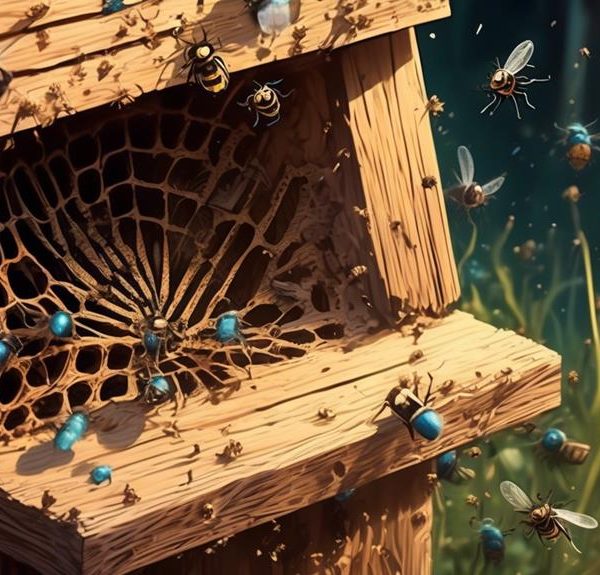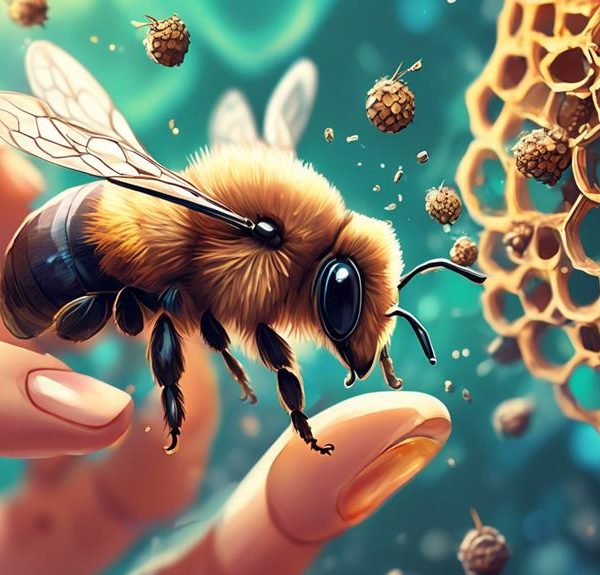Yearning to understand the intricate dynamics of nature's food web? Dive in to explore whether squirrels pose a threat to the industrious mason bees.
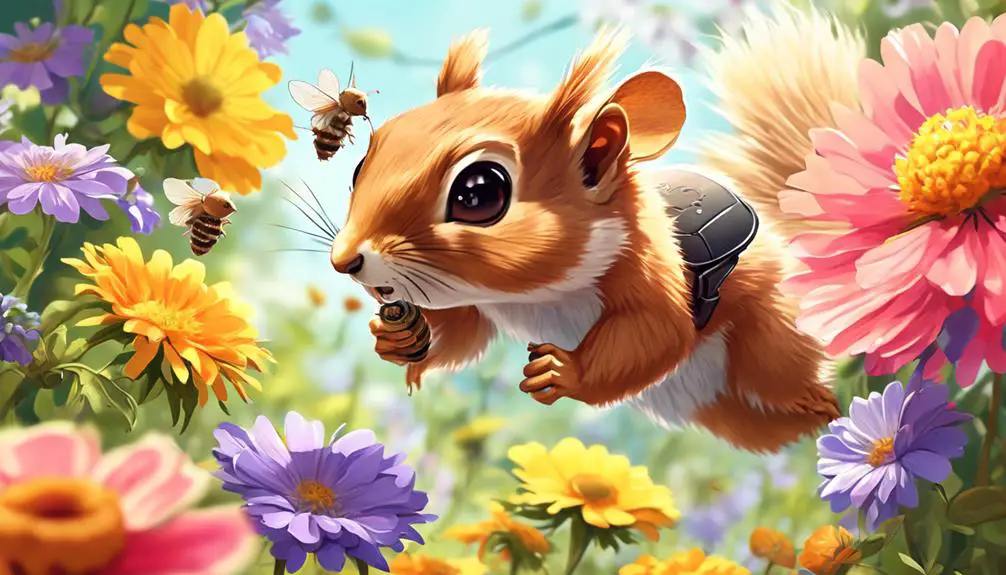
Do Squirrels Eat Mason Bees?
Navigating the dietary habits of squirrels can feel like traversing a maze without a map. You've probably observed these bushy-tailed critters nibbling on an array of treats in your backyard, from fruits and nuts to an occasional bird egg.
But, have you ever stopped to ponder whether these seemingly harmless critters pose a threat to our buzzing friends, the mason bees? There are a few things to consider when looking at this interaction – the foraging behavior of squirrels, the life cycle of mason bees, and the behavioral tendencies of both.
But before we jump to conclusions, let's explore the grey areas that could leave us questioning our understanding of nature's food web.
Key Takeaways
- Squirrels are omnivores but primarily eat plant-based foods such as nuts, seeds, fruits, and vegetables.
- While squirrels may consume insects occasionally, there is no evidence to suggest that they specifically target mason bees.
- Mason bees are solitary creatures that nest in small holes and could be vulnerable to squirrels, but the extent of their interaction is not well understood.
- Squirrels and mason bees have cautious and curious encounters, but squirrels do not typically eat bees, including mason bees, as they are not a significant part of their diet.
Understanding Squirrel Dietary Habits
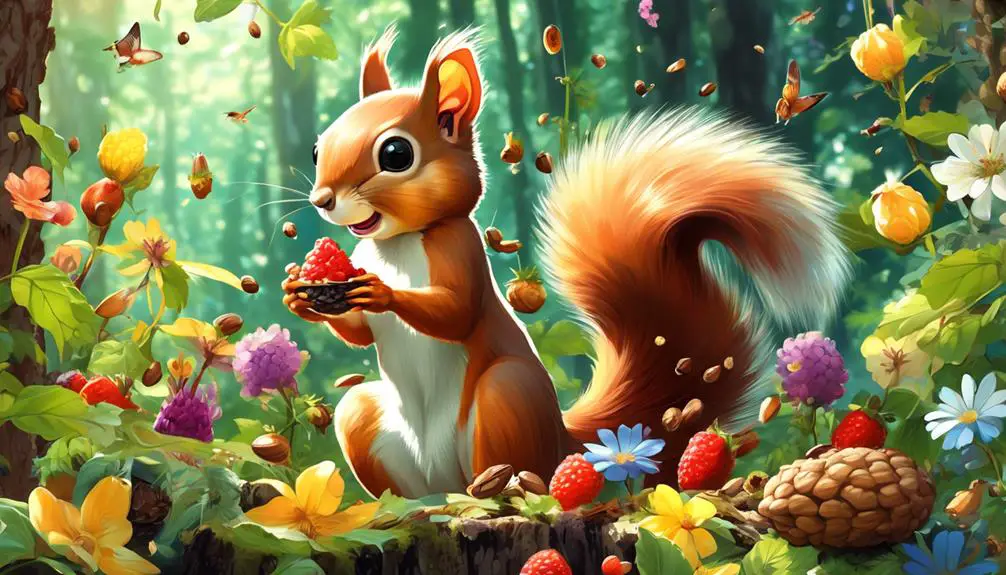
To fully grasp if squirrels feast on mason bees, it's crucial to first delve into their dietary habits, which are surprisingly varied and adaptable. Squirrels, being omnivores, exhibit an eclectic dietary spectrum, consuming a range of foods from plant-based fare to insects, eggs, and small birds when necessary. Their preferred food sources typically include nuts, seeds, fruits, and vegetables, which provide them with the essential nutrients they need to thrive.
However, squirrels' adaptable nature means they're not averse to supplementing their diet with other food sources when their preferred options are scarce. This adaptability allows squirrels to exploit resources that are seasonally or geographically available, ensuring their survival in varied habitats and climates.
In terms of insect consumption, squirrels have been observed eating a variety of insects, particularly when other food sources are limited. It's important to note, though, that insects typically constitute a small part of a squirrel's diet. Hence, while it's possible that squirrels might consume mason bees, such instances would likely be infrequent and opportunistic rather than a regular dietary occurrence.
Therefore, mason bees probably don't have much to fear from these adaptable mammals.
The Life Cycle of Mason Bees
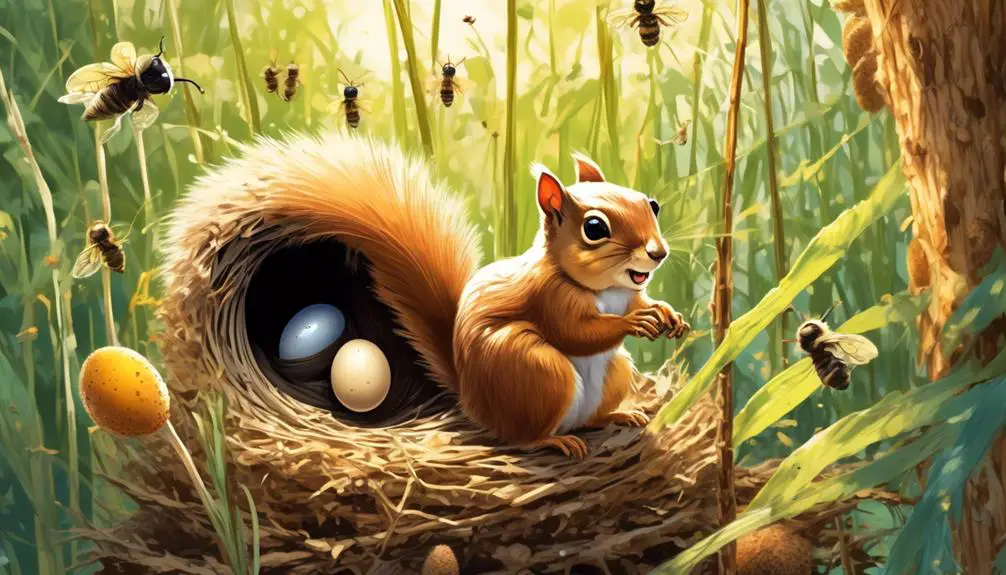
While squirrels' opportunistic eating habits might occasionally include mason bees, understanding the life cycle of these industrious insects offers further insights into their interactions with the environment and potential predators.
Mason bees, unlike their honeybee counterparts, are solitary creatures that live and reproduce individually.
Your journey with these fascinating insects starts in the spring when female mason bees emerge from their cocoons. They mate almost immediately and start scouting for suitable nesting sites. They'll make use of small crevices or tubes, and once they've found an ideal spot, they'll begin to gather pollen and nectar.
You'd find the female bee laying an egg atop a pollen mound within the tube, then sealing off that cell with a mud wall. This process repeats until the tube is filled with these mud-encased cells. Once the female's job is done, she'll die, leaving behind her progeny safely tucked away.
The eggs hatch into larvae, feeding off the stored pollen until they pupate. They'll overwinter in their cocoons, metamorphosing into adult bees. Come next spring, the cycle starts anew, providing a testament to the resilience of mason bees.
Understanding this cycle is key to appreciating their role in the ecosystem and potential vulnerability to predators, such as squirrels.
Squirrels and Their Predatory Behavior
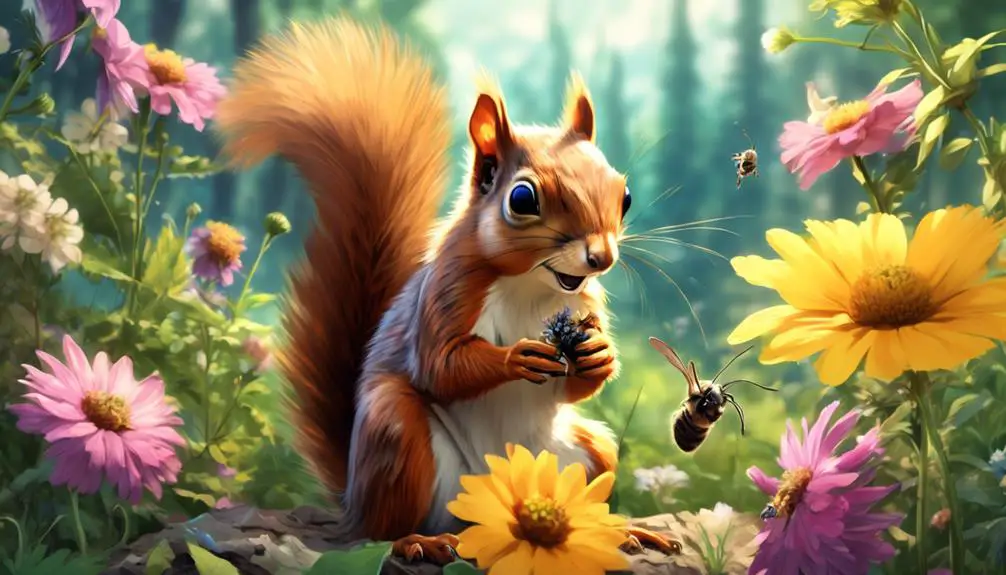
Although squirrels are often seen as cute, harmless creatures, they're actually quite adept predators and their diet can include a variety of foods, potentially even mason bees. You mightn't associate squirrels with predation, but these adaptable rodents are opportunistic feeders, meaning they'll eat whatever is readily available to them.
Sure, squirrels are primarily herbivores. They're fond of nuts, berries, and seeds. But, they won't shy away from insects, eggs, and even small birds when food is scarce. This omnivorous diet allows them to exploit a wide range of habitats and food sources, enhancing their survival rate in various environments.
Now, let's address the question at hand: do squirrels eat mason bees? The answer isn't straightforward. While there's no concrete evidence to suggest that squirrels specifically target mason bees, it's plausible given their diet breadth. It's worth noting that mason bees, being solitary and nesting in small holes, could easily fall prey to a hungry squirrel. However, more research is needed to ascertain this relationship.
Mason Bees in Squirrels' Diet?
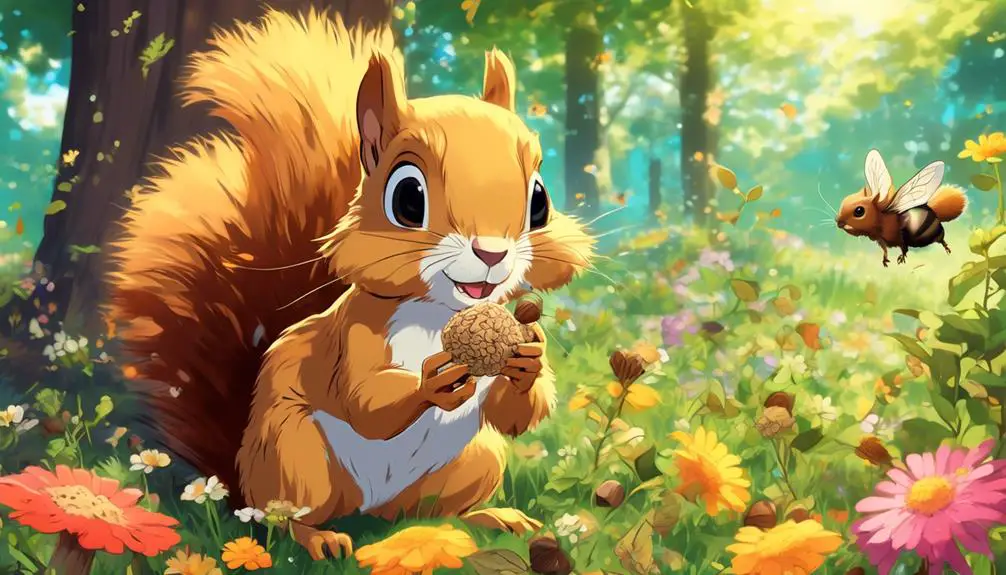
Given the squirrels' dietary adaptability and the vulnerability of mason bees, it's worth exploring the potential inclusion of these particular insects in the squirrel's meal plan. Squirrels are known for their diverse diet, which includes fruits, nuts, seeds, and occasionally insects. However, whether mason bees are part of this menu is less clear.
To better understand this, let's analyze some key factors: the availability of mason bees in the squirrels' habitat, the nutritional value these insects might offer, and the squirrels' ability to catch them.
Factor | Mason Bees | Squirrels |
|---|---|---|
Availability | Abundant in certain regions | Live in varied habitats |
Nutritional Value | High protein source | Require balanced diet |
Hunting Ability | Not typical prey | Agile hunters |
Mason bees are available in abundance in some regions, and they offer a high protein source, which could be beneficial for squirrels. However, they are not typical prey for squirrels, who are primarily herbivores and are more adept at foraging for plant-based food. In conclusion, while it's feasible that squirrels could consume mason bees, it's not a common or significant part of their diet.
Facts About Squirrel and Bee Interactions
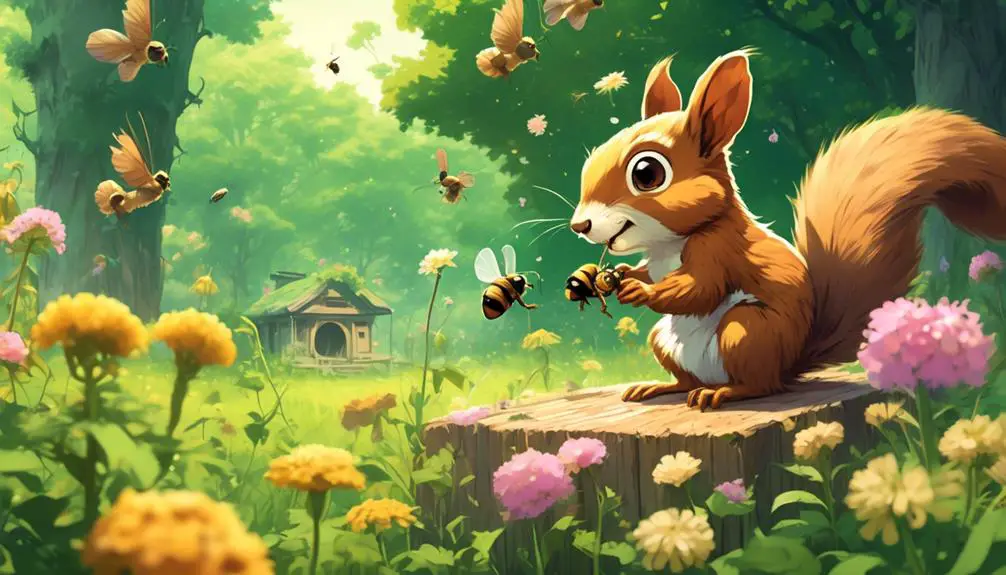
Interestingly, squirrels don't often interact with bees, but when they do, it's a unique blend of curiosity and caution. As a forager by nature, a squirrel may accidentally stumble upon a bee. What happens next is a delicate dance of mutual respect. Squirrels aren't typically aggressive towards bees. Instead, they tread carefully, perhaps recognising the potential for threat.
However, you may question if squirrels eat bees. Scientifically, there's no evidence to suggest so. Squirrels are omnivorous, meaning they eat both plant-based foods and small animals. Typically, they'd prefer nuts, seeds, fruits, and small insects. But bees? They're not on the menu. Bees, particularly mason bees, have a hard exoskeleton and a stinger, making them unattractive as a food source.
In the rare instances where a squirrel may encounter a bee, it's more out of curiosity than hunger. Squirrels are intelligent creatures and may even show interest in the buzzing sound or the bee's flight pattern. But don't worry, the interaction is likely to be brief. The squirrel will quickly lose interest and the bee will continue its journey, ensuring both go their separate ways.
Conclusion
In conclusion, you'll find that squirrels, despite their omnivorous diet, don't typically prey on mason bees. Squirrels' diet primarily consists of nuts, seeds, and fruits, with occasional insects.
However, mason bees, being solitary and non-aggressive, don't attract squirrel attention. While squirrel and bee interactions are minimal, it's crucial to preserve both species' habitats for ecological balance.
Therefore, understanding these dietary habits and behaviors can help you maintain a healthy environment for both.

